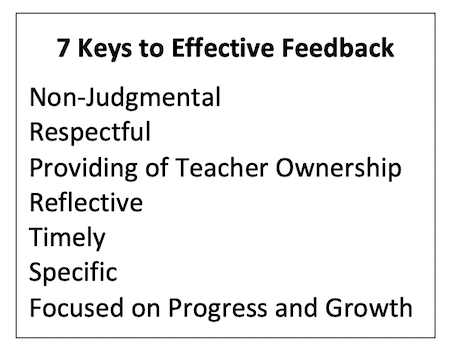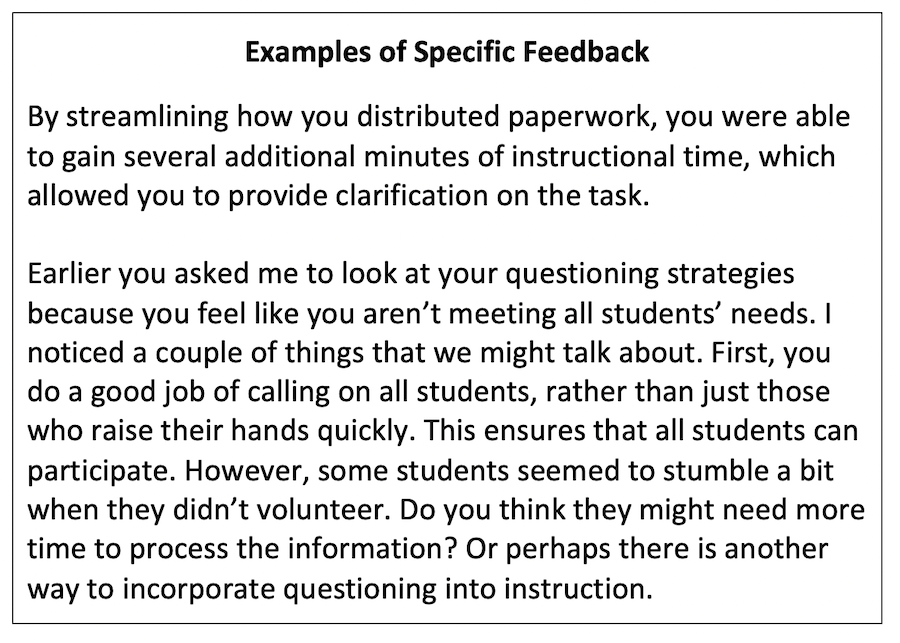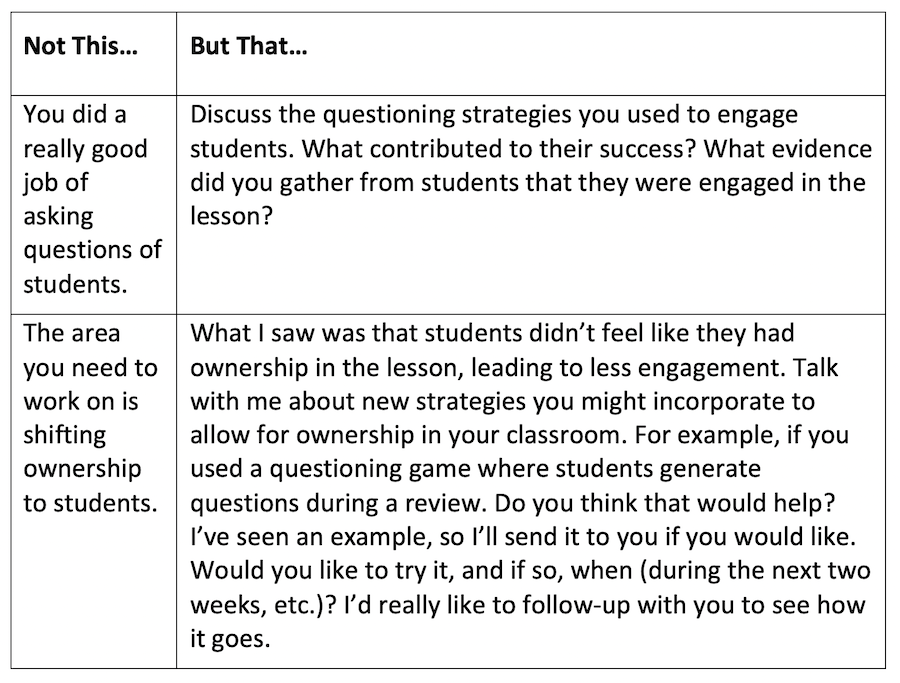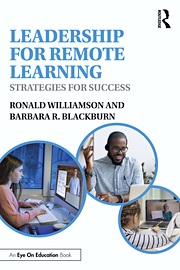Offering Constructive Feedback to Teachers
By Ronald Williamson and Barbara Blackburn

Ron
Principals and other educational leaders have many roles that compete for time and attention. But perhaps the most important role is that of instructional leader because it has the potential to significantly impact students and their learning. When leaders prioritize instruction, so do teachers and other stakeholders.

Barbara
When leaders shine a spotlight on working with teachers to improve instruction, it changes their leadership. Central to effective instructional leadership is the ability to engage teachers in constructive discussion about their teaching.
This may be done in partnership with an instructional coach – in schools that offer such support – or directly by the principal or assistant principal. Whatever the situation, these general guidelines apply.
Generally, effective instructional feedback focuses on improving instruction. In other words, rather than making evaluative statements, we believe it’s important to work collaboratively with teachers to talk about lessons, the choice of instructional strategies, and the impact on students.
We’ve found that almost all teachers can diagnose their teaching and provide insights into how it can be refined and strengthened. That requires a trusting climate where teachers don’t fear that their own analysis will be used against them.
Ron often says that when he was a principal he preferred a teacher who could diagnose their lesson, talk about what worked and didn’t, and develop a plan to strengthen instruction, rather than a teacher who saw no need for improvement and felt everything was just fine.
It’s also important for leaders to differentiate their instructional leadership. The feedback and discussion appropriate for a senior, experienced teacher may be starkly different than that needed by a novice teacher. But regardless of the teacher, or the setting, we‘ve found seven things to be key to effective feedback.

Non-Judgmental, Respectful, Reflective, and Providing of Teacher Ownership
For feedback to be effective, it must be shared in a non-judgmental, respectful manner. Too often, despite intention, comments can come across in ways that are counter-productive. For example, we heard a principal tell a teacher, “I’m sure you agree with me you could have improved on yesterday’s lesson.”
Although she didn’t intend to do so, the principal’s message was interpreted by the teacher as “My principal just told me my lesson wasn’t good.” The teacher also perceived that he was being told to agree with her. A better way to open the discussion would be, “Talk with me about yesterday’s lesson. What were its strengths? What were the challenges?” Using statements and questions that open dialogue, encourage reflection and avoid judgment are key.

Timely and Specific
Next, feedback is most effective if it is timely and specific. When Barbara was a teacher, she was observed by an instructional supervisor from her district office. This was followed by a debriefing, which occurred three weeks later. When the supervisor provided suggestions, Barbara asked follow-up questions, seeking more details. The supervisor wasn’t able to provide information because she had forgotten the particulars. As you might imagine, the conversation wasn’t very effective, nor did it lead to any positive changes.
Barbara’s example also shows the importance of providing specific information. It’s not enough to say, “You taught a strong lesson.” A strong instructional leader can add explicit details and examples. This can re-enforce effective instructional practices and shape instructional improvement.
Another example of the importance of specificity came when Barbara worked with a teacher supervising a student teacher. The student teacher was frustrated with a poor evaluation from the teacher. When we met as a group, the teacher said it was because of a lack of classroom management, but she was not able to provide any details as to what that entailed. We scheduled an observation to purposely look for examples of issues with classroom management.
What we discovered was there were issues with transitions between activities and too much wait time after questioning students, which led to distracting behaviors. Once we identified the specific feedback, we were able to work with the teacher and student teacher to develop strategies for improvement. By having details added to the general feedback, the student teacher made progress to a satisfactory level.

Focused on Progress and Growth
Finally, effective feedback is focused on progress and growth. Too often supervisors focus on deficits without re-enforcing positive aspects of instruction. Or we talk about shortfalls without collaborating on ways to address and improve them. It’s important to encourage reflection and discuss how teachers can grow in their practice. That doesn’t mean ignoring weaknesses; it simply means paying attention to specific strategies that allow a teacher to concentrate his or her efforts toward growth.

A Final Note
The most effective feedback is helpful, focused on improvement rather than deficiencies, and is provided in a non-judgmental, collaborative manner that allows a teacher to reflect on ways they can improve, including specific strategies and actions you may suggest they explore.
By including all the aspects we have discussed, feedback will become more productive and is more likely to result in enhanced teacher practice and student learning.
 Ronald Williamson is Professor of Educational Leadership at Eastern Michigan University. He is a former principal, central office administrator and executive director of the National Middle School Association (now AMLE). The author of numerous books on leadership, he is the co-author with Barbara R. Blackburn of Leadership for Remote Learning (2021) from Routledge and 7 Strategies for Improving Your School (2020).
Ronald Williamson is Professor of Educational Leadership at Eastern Michigan University. He is a former principal, central office administrator and executive director of the National Middle School Association (now AMLE). The author of numerous books on leadership, he is the co-author with Barbara R. Blackburn of Leadership for Remote Learning (2021) from Routledge and 7 Strategies for Improving Your School (2020).
Barbara R. Blackburn, a “Top 30 Global Guru in Education,” is a bestselling author and sought-after consultant. She was an award-winning professor at Winthrop University and has taught students of all ages. In addition to speaking at conferences worldwide, she regularly presents virtual and on-site workshops for teachers and administrators. Barbara is the author of 2020’s Rigor in the Remote Learning Classroom: Instructional Tips and Strategies from Routledge Eye on Education.


































This lesson from this link is helpful and i should study it deeply after this training.